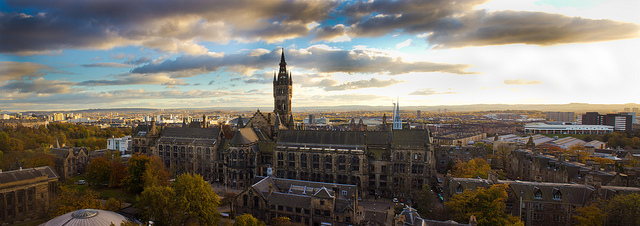
By Natalie Rich /// Staff Writer
In the Fall of 2014, a group of Lewis & Clark students embarked on what they hoped would be a fantastic learning experience in Glasgow, Scotland. They would take classes at the University of Glasgow, see plays in Glasgow and the surrounding cities, visit the Highlands, and engage in a cultural exchange with local Scots. In fact, the 2014 trip was particularly timely considering that Scotland was in the middle of voting on its possible independence from England. However, the trip was plagued by issues which culminated in the dissolution of the official program and LC ending their relationship with the University of Glasgow.
“The University of Glasgow, where we had our program for a number of years, made a radical change in the curriculum. When they adjusted the curriculum for the University, it diminished significantly the kinds of courses students would be able to take,” Larry Meyers, Director of Overseas and Off-Campus Programs said, “You could learn a bit about theatre and history of Scotland and literature and then you could take two courses in areas you were interested and then that went away, and when that went away we felt that it wasn’t in the interest of the institution to continue that.”
As the program’s leader, Professor Michael Olich explained that the University of Glasgow was phasing out their single-semester courses, so LC students had fewer and fewer options for classes. He previously led the trip in 2010, and noted that the program went off without a hitch. But things changed between 2010 and 2014.
“It became more frustrating than rewarding,” he continued. “but the courses we had were great.”
While some students reported issues with affordability, connecting with their Scottish peers, and general social experiences on the trip, the most palpable issue was with credits. Several students reported issues with getting credit for the classes they’d taken.
“Friends of mine, who are now seniors, they don’t have grades from the University of Glasgow,” said Piper Riley ’16.
Riley, a psychology major, signed up for the trip because she studies theater, and wanted to take a trip in the fall. Though she was able to get all the credits she needed, she spoke to the issues that her peers had:
“There are people who it shows on the transcript they went but they just don’t have grades. That’s weird because… [Lewis & Clark] had the longest relationship of any study abroad program. Our year they just screwed over a lot of students.”
Her sentiments were echoed by Morgan Mitchell ‘16.
“I was very lucky in that I got credit. I think I was one of the only people that happened to. At least two of my friends didn’t get their credits until the end of last semester, so a whole year after,” she said.
Pearl Hesselden ‘16, a Fine Arts major, had perhaps the most explicitly difficult time with credit transfer.
“When I got there, I learned that I could only take one studio art class. The credit system is different there than it is here and so I have had to take two extra classes to make up for classes that didn’t transfer the way I was told. For example, I took a life drawing class at the Glasgow School of Art. I was told that not only could I get 4 credits for the class, but it would count for a requirement for my major. When I got back, I found out that it transferred at 2.5 credits which was not enough to fill the requirement,” she said via email, adding that she had to take two extra classes upon her return in order to fulfill her required credits.
LC faculty and staff involved with the trip had different views on the credits issue. While Mitchell and Hesselden both acknowledged that the school failed to inform the students about possible credit problems before the trip or in a timely manner, Larry Meyers disagreed.
“[Credit information] was given to them by the Registrar, so there’s no reason to say ‘we didn’t know’ outside of the fact that ‘we didn’t read’ maybe.”
However, Meyers did admit that there were issues with credits.
“We have to comply with regulations from auditors. There’s a calculator in how credits are transferred based on contact hours. [The University of Glasgow] opened up the art institute but [classes] weren’t credit-worthy of four credits. How do you fix this? That was the challenge there. It was like trying to fit a round peg into a square hole. It was really difficult to fit it in so the students have the latitude to do what they want.”
Both Meyers and Olich said that they had not heard anything about students having difficulties graduating due to the lack of credits from the University of Glasgow.
In addition to the lack of classes and credit issues, students reported general problems with the University of Glasgow. Mitchell reported that students had difficulties getting into higher-level classes, and signing up for any of the classes was also difficult.
“The University of Glasgow wasn’t interested in working with us and creating a program in the way we wanted it to,” Mitchell lamented.
Added Hesselden, “I think the program was cancelled because of the poor quality of our education while there, and generally how unorganized parts were there.”
Subscribe to the Mossy Log Newsletter
Stay up to date with the goings-on at Lewis & Clark! Get the top stories or your favorite section delivered to your inbox whenever we release a new issue.

Leave a Reply